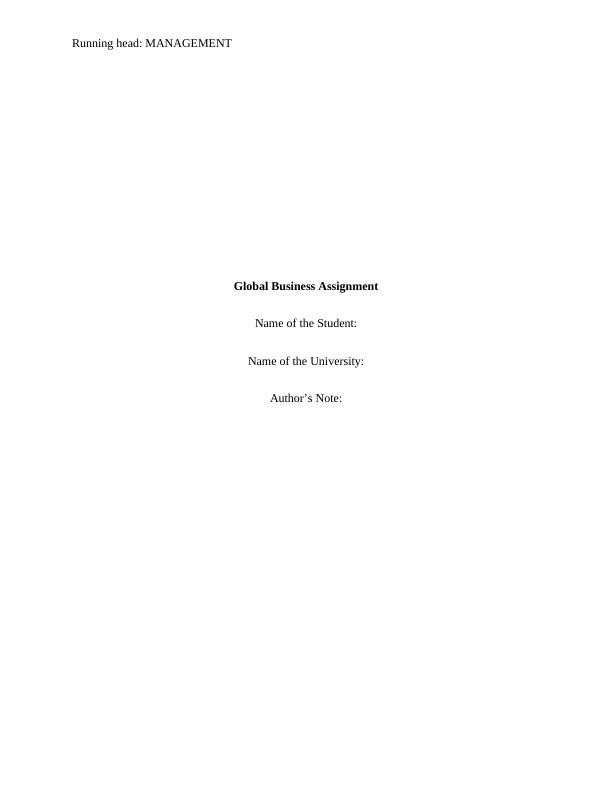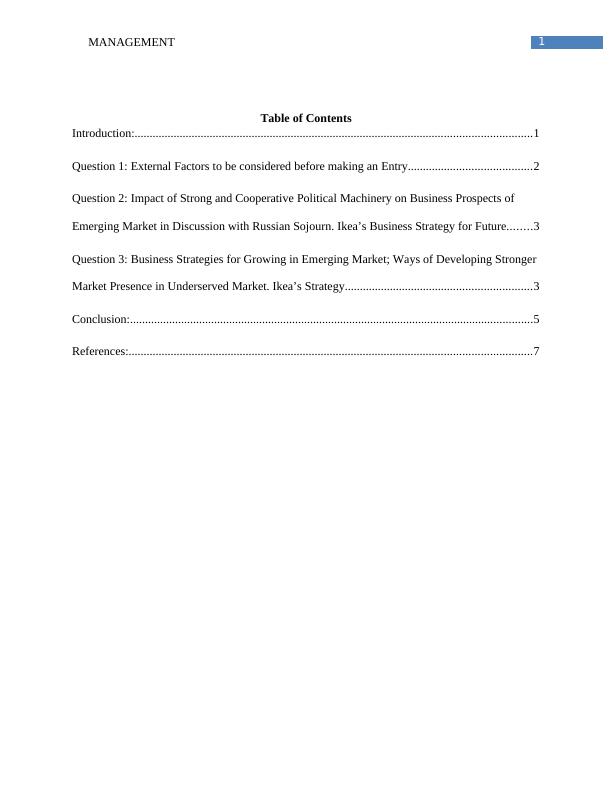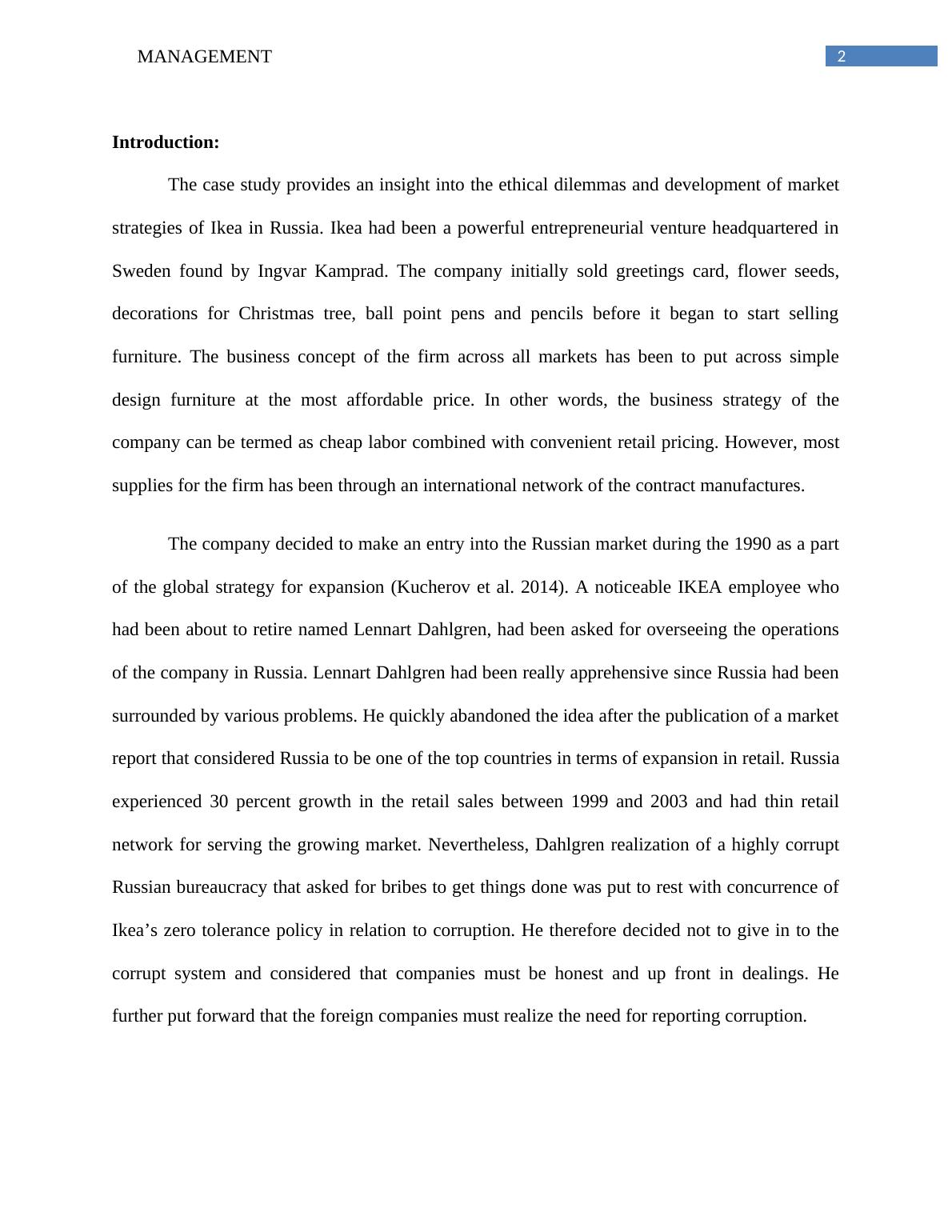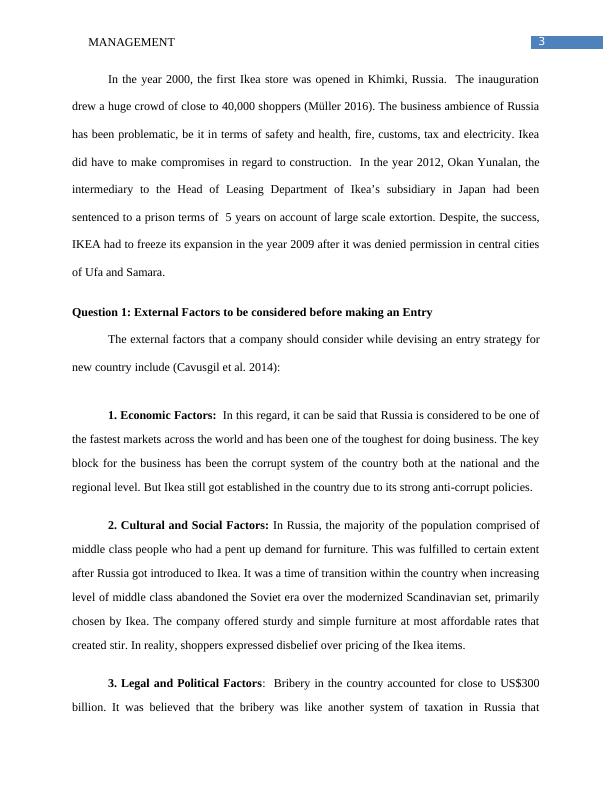Journal of International Management
11 Pages2169 Words22 Views
Added on 2022-08-31
Journal of International Management
Added on 2022-08-31
ShareRelated Documents
Running head: MANAGEMENT
Global Business Assignment
Name of the Student:
Name of the University:
Author’s Note:
Global Business Assignment
Name of the Student:
Name of the University:
Author’s Note:

1MANAGEMENT
Table of Contents
Introduction:....................................................................................................................................1
Question 1: External Factors to be considered before making an Entry.........................................2
Question 2: Impact of Strong and Cooperative Political Machinery on Business Prospects of
Emerging Market in Discussion with Russian Sojourn. Ikea’s Business Strategy for Future........3
Question 3: Business Strategies for Growing in Emerging Market; Ways of Developing Stronger
Market Presence in Underserved Market. Ikea’s Strategy..............................................................3
Conclusion:......................................................................................................................................5
References:......................................................................................................................................7
Table of Contents
Introduction:....................................................................................................................................1
Question 1: External Factors to be considered before making an Entry.........................................2
Question 2: Impact of Strong and Cooperative Political Machinery on Business Prospects of
Emerging Market in Discussion with Russian Sojourn. Ikea’s Business Strategy for Future........3
Question 3: Business Strategies for Growing in Emerging Market; Ways of Developing Stronger
Market Presence in Underserved Market. Ikea’s Strategy..............................................................3
Conclusion:......................................................................................................................................5
References:......................................................................................................................................7

2MANAGEMENT
Introduction:
The case study provides an insight into the ethical dilemmas and development of market
strategies of Ikea in Russia. Ikea had been a powerful entrepreneurial venture headquartered in
Sweden found by Ingvar Kamprad. The company initially sold greetings card, flower seeds,
decorations for Christmas tree, ball point pens and pencils before it began to start selling
furniture. The business concept of the firm across all markets has been to put across simple
design furniture at the most affordable price. In other words, the business strategy of the
company can be termed as cheap labor combined with convenient retail pricing. However, most
supplies for the firm has been through an international network of the contract manufactures.
The company decided to make an entry into the Russian market during the 1990 as a part
of the global strategy for expansion (Kucherov et al. 2014). A noticeable IKEA employee who
had been about to retire named Lennart Dahlgren, had been asked for overseeing the operations
of the company in Russia. Lennart Dahlgren had been really apprehensive since Russia had been
surrounded by various problems. He quickly abandoned the idea after the publication of a market
report that considered Russia to be one of the top countries in terms of expansion in retail. Russia
experienced 30 percent growth in the retail sales between 1999 and 2003 and had thin retail
network for serving the growing market. Nevertheless, Dahlgren realization of a highly corrupt
Russian bureaucracy that asked for bribes to get things done was put to rest with concurrence of
Ikea’s zero tolerance policy in relation to corruption. He therefore decided not to give in to the
corrupt system and considered that companies must be honest and up front in dealings. He
further put forward that the foreign companies must realize the need for reporting corruption.
Introduction:
The case study provides an insight into the ethical dilemmas and development of market
strategies of Ikea in Russia. Ikea had been a powerful entrepreneurial venture headquartered in
Sweden found by Ingvar Kamprad. The company initially sold greetings card, flower seeds,
decorations for Christmas tree, ball point pens and pencils before it began to start selling
furniture. The business concept of the firm across all markets has been to put across simple
design furniture at the most affordable price. In other words, the business strategy of the
company can be termed as cheap labor combined with convenient retail pricing. However, most
supplies for the firm has been through an international network of the contract manufactures.
The company decided to make an entry into the Russian market during the 1990 as a part
of the global strategy for expansion (Kucherov et al. 2014). A noticeable IKEA employee who
had been about to retire named Lennart Dahlgren, had been asked for overseeing the operations
of the company in Russia. Lennart Dahlgren had been really apprehensive since Russia had been
surrounded by various problems. He quickly abandoned the idea after the publication of a market
report that considered Russia to be one of the top countries in terms of expansion in retail. Russia
experienced 30 percent growth in the retail sales between 1999 and 2003 and had thin retail
network for serving the growing market. Nevertheless, Dahlgren realization of a highly corrupt
Russian bureaucracy that asked for bribes to get things done was put to rest with concurrence of
Ikea’s zero tolerance policy in relation to corruption. He therefore decided not to give in to the
corrupt system and considered that companies must be honest and up front in dealings. He
further put forward that the foreign companies must realize the need for reporting corruption.

3MANAGEMENT
In the year 2000, the first Ikea store was opened in Khimki, Russia. The inauguration
drew a huge crowd of close to 40,000 shoppers (Müller 2016). The business ambience of Russia
has been problematic, be it in terms of safety and health, fire, customs, tax and electricity. Ikea
did have to make compromises in regard to construction. In the year 2012, Okan Yunalan, the
intermediary to the Head of Leasing Department of Ikea’s subsidiary in Japan had been
sentenced to a prison terms of 5 years on account of large scale extortion. Despite, the success,
IKEA had to freeze its expansion in the year 2009 after it was denied permission in central cities
of Ufa and Samara.
Question 1: External Factors to be considered before making an Entry
The external factors that a company should consider while devising an entry strategy for
new country include (Cavusgil et al. 2014):
1. Economic Factors: In this regard, it can be said that Russia is considered to be one of
the fastest markets across the world and has been one of the toughest for doing business. The key
block for the business has been the corrupt system of the country both at the national and the
regional level. But Ikea still got established in the country due to its strong anti-corrupt policies.
2. Cultural and Social Factors: In Russia, the majority of the population comprised of
middle class people who had a pent up demand for furniture. This was fulfilled to certain extent
after Russia got introduced to Ikea. It was a time of transition within the country when increasing
level of middle class abandoned the Soviet era over the modernized Scandinavian set, primarily
chosen by Ikea. The company offered sturdy and simple furniture at most affordable rates that
created stir. In reality, shoppers expressed disbelief over pricing of the Ikea items.
3. Legal and Political Factors: Bribery in the country accounted for close to US$300
billion. It was believed that the bribery was like another system of taxation in Russia that
In the year 2000, the first Ikea store was opened in Khimki, Russia. The inauguration
drew a huge crowd of close to 40,000 shoppers (Müller 2016). The business ambience of Russia
has been problematic, be it in terms of safety and health, fire, customs, tax and electricity. Ikea
did have to make compromises in regard to construction. In the year 2012, Okan Yunalan, the
intermediary to the Head of Leasing Department of Ikea’s subsidiary in Japan had been
sentenced to a prison terms of 5 years on account of large scale extortion. Despite, the success,
IKEA had to freeze its expansion in the year 2009 after it was denied permission in central cities
of Ufa and Samara.
Question 1: External Factors to be considered before making an Entry
The external factors that a company should consider while devising an entry strategy for
new country include (Cavusgil et al. 2014):
1. Economic Factors: In this regard, it can be said that Russia is considered to be one of
the fastest markets across the world and has been one of the toughest for doing business. The key
block for the business has been the corrupt system of the country both at the national and the
regional level. But Ikea still got established in the country due to its strong anti-corrupt policies.
2. Cultural and Social Factors: In Russia, the majority of the population comprised of
middle class people who had a pent up demand for furniture. This was fulfilled to certain extent
after Russia got introduced to Ikea. It was a time of transition within the country when increasing
level of middle class abandoned the Soviet era over the modernized Scandinavian set, primarily
chosen by Ikea. The company offered sturdy and simple furniture at most affordable rates that
created stir. In reality, shoppers expressed disbelief over pricing of the Ikea items.
3. Legal and Political Factors: Bribery in the country accounted for close to US$300
billion. It was believed that the bribery was like another system of taxation in Russia that

End of preview
Want to access all the pages? Upload your documents or become a member.
Related Documents
Report: IKEA at Russialg...
|11
|3048
|47
Ikea's Business Strategy in Russialg...
|10
|2528
|224
Managing Across Border - IKEA in Russia- Ethical Dilemma Caselg...
|5
|1181
|69
IKEA Case Studylg...
|10
|2804
|39
IKEA in Russia: Strategies and Ethical Dilemmaslg...
|7
|2050
|150
Global Business Dynamics: Ikea Russia Case Studylg...
|8
|2262
|271
